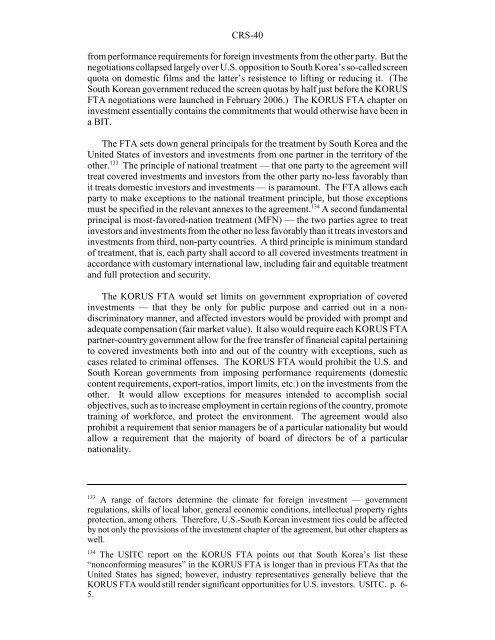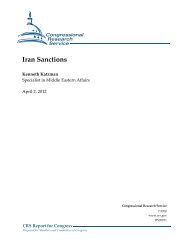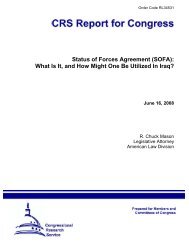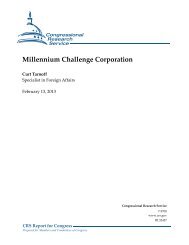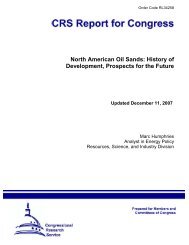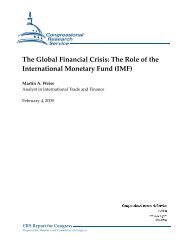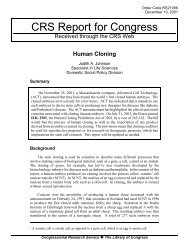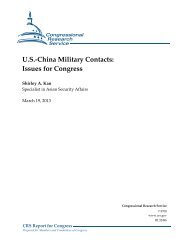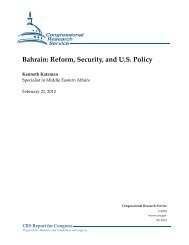The Proposed U.S.-South Korea Free Trade Agreement (KORUS ...
The Proposed U.S.-South Korea Free Trade Agreement (KORUS ...
The Proposed U.S.-South Korea Free Trade Agreement (KORUS ...
- TAGS
- korea
- fpc.state.gov
Create successful ePaper yourself
Turn your PDF publications into a flip-book with our unique Google optimized e-Paper software.
CRS-40<br />
from performance requirements for foreign investments from the other party. But the<br />
negotiations collapsed largely over U.S. opposition to <strong>South</strong> <strong>Korea</strong>’s so-called screen<br />
quota on domestic films and the latter’s resistence to lifting or reducing it. (<strong>The</strong><br />
<strong>South</strong> <strong>Korea</strong>n government reduced the screen quotas by half just before the <strong>KORUS</strong><br />
FTA negotiations were launched in February 2006.) <strong>The</strong> <strong>KORUS</strong> FTA chapter on<br />
investment essentially contains the commitments that would otherwise have been in<br />
a BIT.<br />
<strong>The</strong> FTA sets down general principals for the treatment by <strong>South</strong> <strong>Korea</strong> and the<br />
United States of investors and investments from one partner in the territory of the<br />
other. 133 <strong>The</strong> principle of national treatment — that one party to the agreement will<br />
treat covered investments and investors from the other party no-less favorably than<br />
it treats domestic investors and investments — is paramount. <strong>The</strong> FTA allows each<br />
party to make exceptions to the national treatment principle, but those exceptions<br />
must be specified in the relevant annexes to the agreement. 134 A second fundamental<br />
principal is most-favored-nation treatment (MFN) — the two parties agree to treat<br />
investors and investments from the other no less favorably than it treats investors and<br />
investments from third, non-party countries. A third principle is minimum standard<br />
of treatment, that is, each party shall accord to all covered investments treatment in<br />
accordance with customary international law, including fair and equitable treatment<br />
and full protection and security.<br />
<strong>The</strong> <strong>KORUS</strong> FTA would set limits on government expropriation of covered<br />
investments — that they be only for public purpose and carried out in a nondiscriminatory<br />
manner, and affected investors would be provided with prompt and<br />
adequate compensation (fair market value). It also would require each <strong>KORUS</strong> FTA<br />
partner-country government allow for the free transfer of financial capital pertaining<br />
to covered investments both into and out of the country with exceptions, such as<br />
cases related to criminal offenses. <strong>The</strong> <strong>KORUS</strong> FTA would prohibit the U.S. and<br />
<strong>South</strong> <strong>Korea</strong>n governments from imposing performance requirements (domestic<br />
content requirements, export-ratios, import limits, etc.) on the investments from the<br />
other. It would allow exceptions for measures intended to accomplish social<br />
objectives, such as to increase employment in certain regions of the country, promote<br />
training of workforce, and protect the environment. <strong>The</strong> agreement would also<br />
prohibit a requirement that senior managers be of a particular nationality but would<br />
allow a requirement that the majority of board of directors be of a particular<br />
nationality.<br />
133 A range of factors determine the climate for foreign investment — government<br />
regulations, skills of local labor, general economic conditions, intellectual property rights<br />
protection, among others. <strong>The</strong>refore, U.S.-<strong>South</strong> <strong>Korea</strong>n investment ties could be affected<br />
by not only the provisions of the investment chapter of the agreement, but other chapters as<br />
well.<br />
134 <strong>The</strong> USITC report on the <strong>KORUS</strong> FTA points out that <strong>South</strong> <strong>Korea</strong>’s list these<br />
“nonconforming measures” in the <strong>KORUS</strong> FTA is longer than in previous FTAs that the<br />
United States has signed; however, industry representatives generally believe that the<br />
<strong>KORUS</strong> FTA would still render significant opportunities for U.S. investors. USITC. p. 6-<br />
5.


